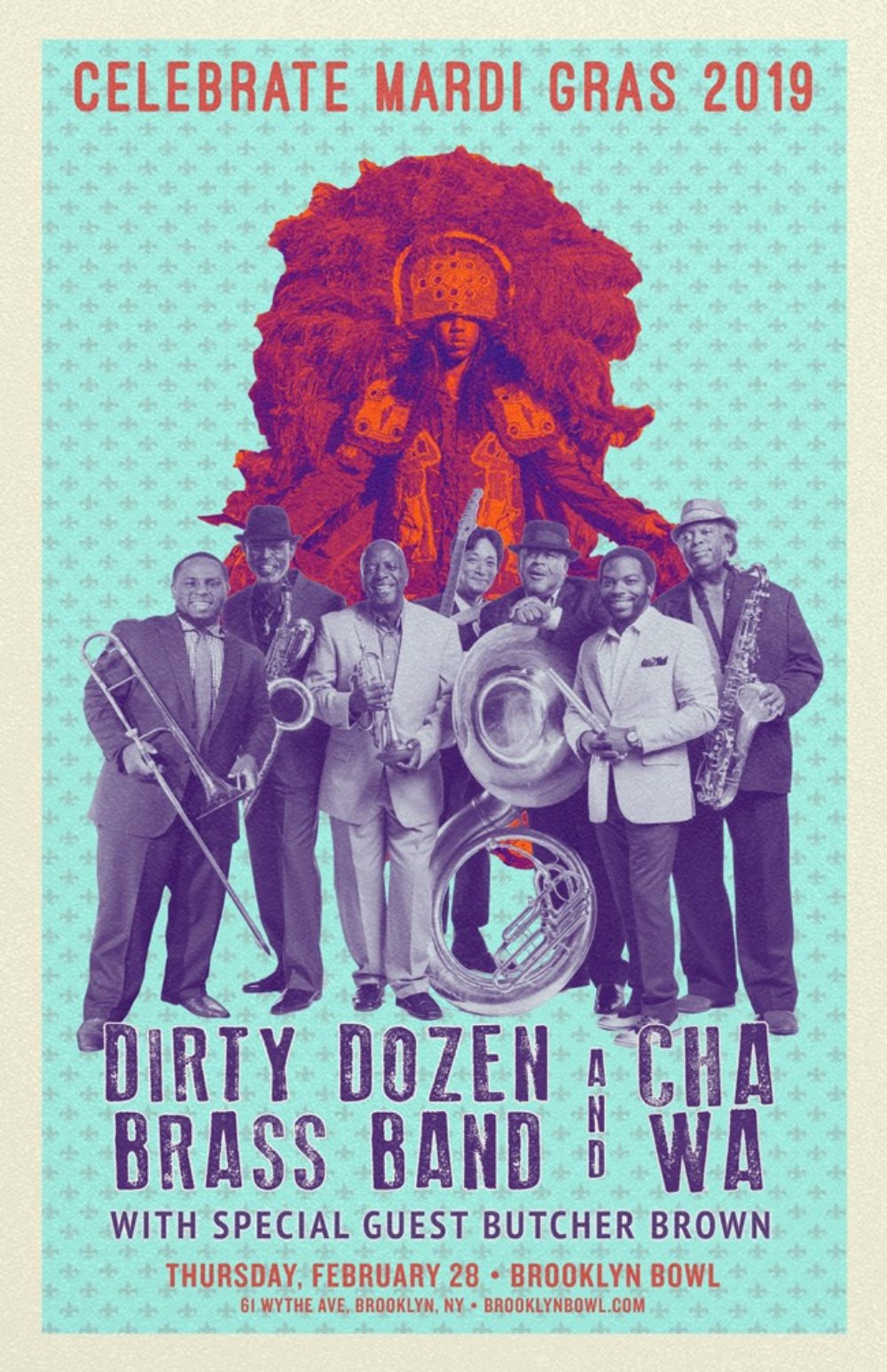
From the funk-laced beats and bass-heavy sousaphone blasts that kick off their album “Spyboy” to the gritty warmth of singer J’Wan Boudreaux’s voice, New Orleans brass band-meets-Mardi Gras Indian outfit Cha Wa radiates the fiery energy of the best features of the city’s street culture. “Spyboy” was produced by Galactic’s Ben Ellman and features special guests Big Chief Monk Boudreaux (The Wild Magnolias, HBO’s Treme), Nigel Hall (Lettuce, Nth Power), and Danica Hart.
Cha Wa’s debut, “Funk N Feathers,” explored contemporary riffs on the traditional music Boudreaux grew up singing alongside his grandfather, Big Chief Monk Boudreaux, in the Golden Eagles Mardi Gras Indian tribe. Now “Spyboy” ups the ante by digging deeper into the sound of New Orleans culture and giving it a modern twist. The disc’s largely original material takes advantage of the band’s new horn section to highlight the musicians’ personal ties to the street music of their hometown. “We wanted to take the roots of what we love about New Orleans brass band music and Mardi Gras Indian music and then voice it in our own way,” says the group’s drummer and founder, Joe Gelini.
Dating back to the late 1800s, the Mardi Gras Indian tradition began when African-American men first marched in Native American dress through the streets of New Orleans on Mardi Gras day. The tradition, which includes a host of songs shared among the various tribes, has been kept alive for over a century and today is as vital as ever. Mardi Gras Indians have influenced the biggest names in New Orleans music: The Meters, Dr. John, the Marsalis family, the Neville Brothers, Trombone Shorty and others. The most prominent Mardi Gras Indian today is Monk Boudreaux, the Big Chief of the Golden Eagles tribe, and his grandson J’Wan Boudreaux (who holds the position of Spyboy in the tribe) is stepping up with Cha Wa to propel their culture forward.
J’Wan joined the group when he was still in high school. At the time, Gelini, then a recent Berklee School of Music grad, had been playing drums for Boudreaux’s grandfather, having learned the traditional Mardi Gras Indian beats from original Wild Magnolias bass drummer Norwood “Geechie” Johnson at Sunday night Indian practices in Uptown New Orleans. As the band evolved, J’Wan emerged as the front man. On “Spyboy,” Boudreaux’s vocals (with support from Thaddeus “Peanut” Ramsey’s smooth-voiced Indian style), the booming, funked-up sound of the band’s new four-part horn section, and Gelini’s mix of second line grooves and soulful Indian rhythms have all combined to kindle a new fire in Cha Wa’s ever-developing sound.
Although “cha wa” means “we’re comin’ for ya” in Indian vernacular, Boudreaux says the album “Spyboy” is “Cha Wa all around” for a different reason. With songwriting contributions to “Spyboy” from band members Joe Maize, Thaddeus ‘Peanut’ Ramsey, Ari Teitel and Clifton ‘Spug’ Smith, along with J’Wan and Gelini, Cha Wa ignites an entire new generation with contemporary anthems set ablaze by its high-flying ensemble. Says Boudreaux, “Everyone put their minds together to make this music. Everyone had input on at least one song. And the whole band has a different type of connection these days. Everybody’s bonded now. Everybody’s just having fun”.
The track “Get On Out the Way” -- with its loose, ‘70s funk rhythm, tight horn parts and deep, bouncing sousaphone -- brings that celebratory vibe to life by spiking a traditional Indian phrase with a fast-moving brass band twist.
There’s also a more serious, social message at work in Cha Wa’s music. Gelini and Monk wrote “Visible Means Of Support” about Monk’s experience with the ‘50s-era Jim Crow vagrancy law used primarily to arrest African-American men. On the J’Wan-penned, big beat-centric “Chapters,” the singer tackles more contemporary issues, in this case, the internal struggles he faced while being raised by a single mom.
The mellow, piano and vocals-only “J’Wan’s story” sees him taking a different approach to bridging the gap between beauty and harsh reality in New Orleans when he explains, spoken word-style, the basics about how and why Mardi Gras Indian culture developed.
“We dress up in the Indian suits to pay homage to the Native American Indians, because around the time of slavery, they were the first ones to take us in,” he says, elaborating on the song. “Everything on our suits is handmade -- the beads, the patterns, we sew together pieces of fabric and make the panels, we make the boots -- everything.”
Not that you need a firm understanding of Indian or brass band culture to feel the dance-ready vibrations of Cha Wa’s new music. “It’s dance music so I think people are attracted to it. Even if people have no idea what the history is, it’s automatically infectious,” Gelini explains. “J’wan’s the next generation,” the drummer adds. “He’s keeping this flame lit.”







